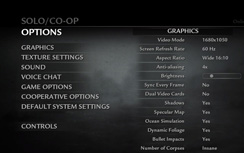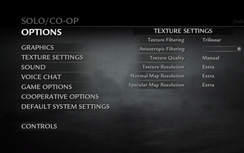
Call of Duty: World at War
Publisher: ActivisionCall of Duty: World at War is Treyarch’s controversial World War II shooter set on the Pacific and Eastern fronts, where you switch roles between an American Marine and a Russian soldier who survives Stalingrad and follows the push into Berlin at the end of the war.
World at War uses a beefed up version of the proprietary engine used in Call of Duty 4: Modern Warfare, which was developed by Infinity Ward and has easily been the most successful game in the series. It uses the DirectX 9.0 renderer exclusively and features true world dynamic lighting, HDR lighting, dynamic shadowing and depth of field amongst other things.
We used the full retail version of the game downloaded from Steam, which was patched to version 1.1 and for our gameplay testing, we did a 90-second manual run through from the second mission in the game where you are part of a beach landing in the Pacific. It appears to be one of the more intensive parts of the game with lots of explosions, water, smoke and lighting effects thrown in for good measure.
All of the in-game settings were set to their maximum values, including texture details which were configured to 'Extra'. The 'Dual Video Cards' option was enabled for the multi-GPU configurations, but was disabled for all single GPU cards. Finally, anti-aliasing and anisotropic filtering were controlled from inside the game.
Call of Duty: World at War
1,680 x 1,050 4xAA 16xAF, DirectX 9, Maximum Detail
- Nvidia GeForce GTX 280 1GB SLI
- Nvidia GeForce GTX 260-216 896MB SLI
- Nvidia GeForce GTX 295 1,792MB
- ATI Radeon HD 4870 1GB CrossFire
- ATI Radeon HD 4870 X2 2GB
- Sapphire ATI Radeon HD 4850 X2 2GB
- Nvidia GeForce GTX 285 1GB
- Nvidia GeForce GTX 280 1GB
- Nvidia GeForce GTX 260-216 896MB
- ATI Radeon HD 4870 512MB
- ATI Radeon HD 4870 1GB
-
-
90.7
-
75.0
-
-
-
89.9
-
72.0
-
-
-
88.9
-
70.0
-
-
-
78.5
-
19.0
-
-
-
74.7
-
20.0
-
-
-
70.2
-
19.0
-
-
-
69.9
-
55.0
-
-
-
62.3
-
48.0
-
-
-
57.0
-
42.0
-
-
-
48.2
-
36.0
-
-
-
47.9
-
33.0
-
0
25
50
75
100
Frames Per Second
-
Average
-
Minimum
Call of Duty: World at War
1,920 x 1,200 0xAA 16xAF, DirectX 9, Maximum Detail
- Nvidia GeForce GTX 280 1GB SLI
- Nvidia GeForce GTX 260-216 896MB SLI
- Nvidia GeForce GTX 295 1,792MB
- ATI Radeon HD 4870 1GB CrossFire
- ATI Radeon HD 4870 X2 2GB
- Nvidia GeForce GTX 285 1GB
- Nvidia GeForce GTX 280 1GB
- Sapphire ATI Radeon HD 4850 X2 2GB
- Nvidia GeForce GTX 260-216 896MB
- ATI Radeon HD 4870 1GB
- ATI Radeon HD 4870 512MB
-
-
90.8
-
80.0
-
-
-
90.7
-
73.0
-
-
-
90.7
-
74.0
-
-
-
80.0
-
16.0
-
-
-
77.3
-
16.0
-
-
-
75.2
-
59.0
-
-
-
68.9
-
54.0
-
-
-
65.0
-
20.0
-
-
-
62.6
-
44.0
-
-
-
49.9
-
37.0
-
-
-
49.7
-
36.0
-
0
25
50
75
100
Frames Per Second
-
Average
-
Minimum
Call of Duty: World at War
1,920 x 1,200 4xAA 16xAF, DirectX 9, Maximum Detail
- Nvidia GeForce GTX 280 1GB SLI
- Nvidia GeForce GTX 260-216 896MB SLI
- Nvidia GeForce GTX 295 1,792MB
- ATI Radeon HD 4870 1GB CrossFire
- ATI Radeon HD 4870 X2 2GB
- Nvidia GeForce GTX 285 1GB
- Sapphire ATI Radeon HD 4850 X2 2GB
- Nvidia GeForce GTX 280 1GB
- Nvidia GeForce GTX 260-216 896MB
- ATI Radeon HD 4870 1GB
- ATI Radeon HD 4870 512MB
-
-
89.1
-
66.0
-
-
-
83.2
-
58.0
-
-
-
83.0
-
59.0
-
-
-
69.0
-
18.0
-
-
-
65.0
-
16.0
-
-
-
61.6
-
44.0
-
-
-
55.8
-
18.0
-
-
-
55.1
-
38.0
-
-
-
49.3
-
34.0
-
-
-
40.7
-
28.0
-
-
-
40.5
-
29.0
-
0
10
20
30
40
50
60
70
80
90
Frames Per Second
-
Average
-
Minimum
Call of Duty: World at War
2,560 x 1,600 0xAA 16xAF, DirectX 9, Maximum Detail
- Nvidia GeForce GTX 280 1GB SLI
- Nvidia GeForce GTX 295 1,792MB
- Nvidia GeForce GTX 260-216 896MB SLI
- Nvidia GeForce GTX 285 1GB
- ATI Radeon HD 4870 1GB CrossFire
- ATI Radeon HD 4870 X2 2GB
- Nvidia GeForce GTX 280 1GB
- Nvidia GeForce GTX 260-216 896MB
- Sapphire ATI Radeon HD 4850 X2 2GB
- ATI Radeon HD 4870 1GB
- ATI Radeon HD 4870 512MB
-
-
81.8
-
28.0
-
-
-
76.4
-
26.0
-
-
-
75.5
-
28.0
-
-
-
56.8
-
38.0
-
-
-
55.2
-
11.0
-
-
-
52.9
-
11.0
-
-
-
50.2
-
33.0
-
-
-
44.3
-
26.0
-
-
-
44.2
-
11.0
-
-
-
33.0
-
22.0
-
-
-
32.9
-
22.0
-
0
10
20
30
40
50
60
70
80
90
Frames Per Second
-
Average
-
Minimum
Call of Duty: World at War
2,560 x 1,600 4xAA 16xAF, DirectX 9, Maximum Detail
- Nvidia GeForce GTX 280 1GB SLI
- Nvidia GeForce GTX 295 1,792MB
- Nvidia GeForce GTX 260-216 896MB SLI
- Nvidia GeForce GTX 285 1GB
- ATI Radeon HD 4870 1GB CrossFire
- ATI Radeon HD 4870 X2 2GB
- Nvidia GeForce GTX 280 1GB
- Nvidia GeForce GTX 260-216 896MB
- Sapphire ATI Radeon HD 4850 X2 2GB
- ATI Radeon HD 4870 1GB
- ATI Radeon HD 4870 512MB
-
-
72.3
-
26.0
-
-
-
66.4
-
24.0
-
-
-
65.2
-
24.0
-
-
-
48.2
-
33.0
-
-
-
46.2
-
10.0
-
-
-
43.6
-
9.0
-
-
-
43.1
-
29.0
-
-
-
37.9
-
21.0
-
-
-
36.5
-
8.0
-
-
-
27.1
-
19.0
-
-
-
26.2
-
17.0
-
0
10
20
30
40
50
60
70
80
Frames Per Second
-
Average
-
Minimum
World at War suffers from poor CrossFire scaling and so the advantage is generally in Nvidia's favour. The GeForce GTX 285 ekes out a ten percent performance advantage at 1,920 x 1,200 4xAA and has a significantly higher minimum frame rate, meaning the performance gap is exaggerated because of the much smoother experience.
At 2,560 x 1,600 4xAA 16xAF, that gap increases to a massive 32 percent and again the minimum frame rates are night and day - 33 versus just eight on the 4850 X2 - meaning that performance difference is even larger than it seems from just looking at the average frame rates.











Want to comment? Please log in.